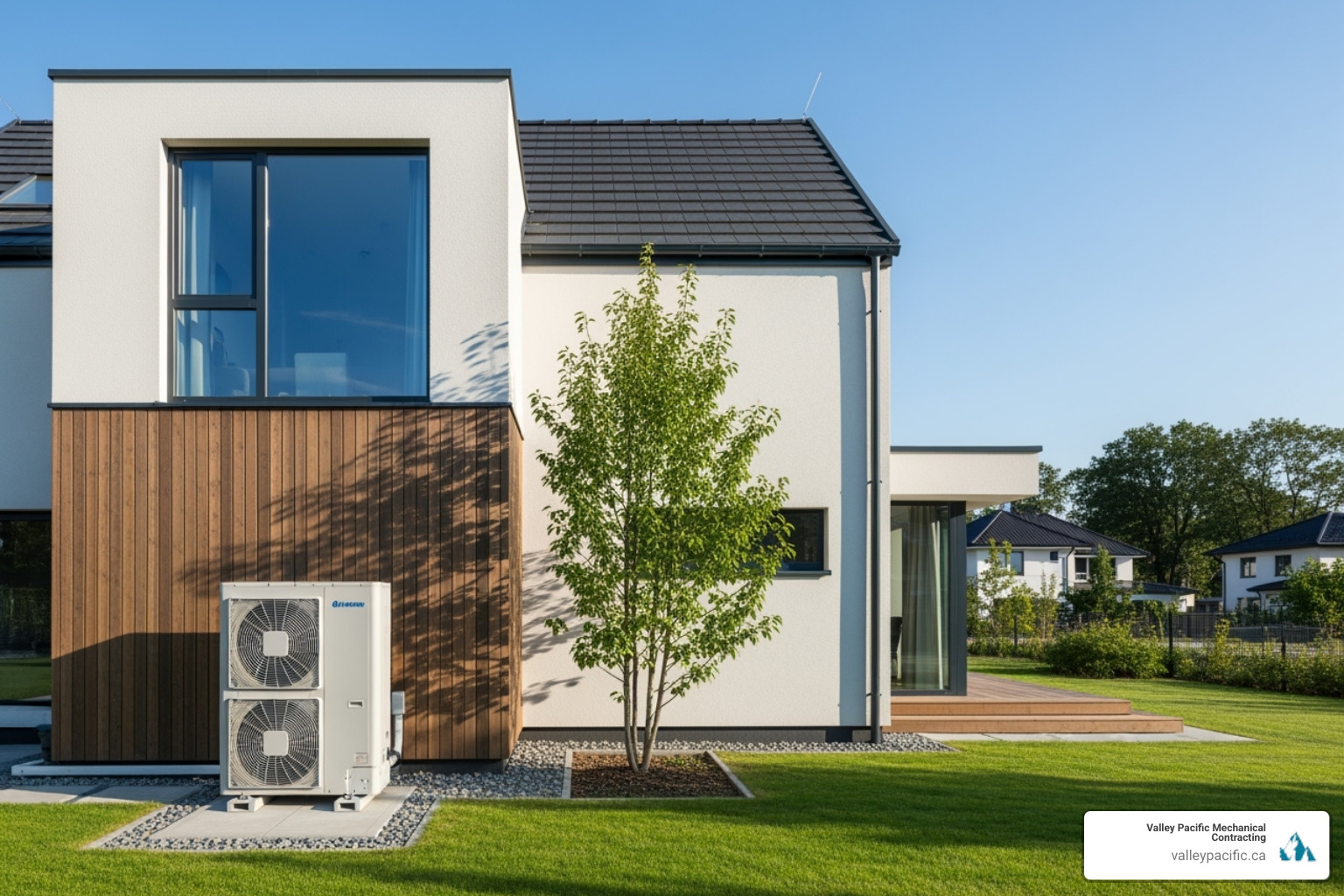Heating and Cooling Made Easy with Residential Heat Pumps


Why Residential Heat Pumps Are Revolutionizing Home Comfort
A residential heat pump is an all-in-one heating and cooling system that transfers heat rather than generating it, making it up to 75% more energy-efficient than traditional electric heating systems. Here's what makes heat pumps special:
Key Benefits:
- Year-round comfort - provides both heating and cooling
- Energy efficient - reduces electricity use by up to 75% compared to electric resistance heating
- Environmentally friendly - no fossil fuel burning required
- Cost-effective - lower operating costs than traditional systems
- Reliable - works effectively even in cold climates like BC's Lower Mainland
How It Works:Heat pumps operate like a refrigerator in reverse. In winter, they extract heat from outside air (even when it's cold) and transfer it inside. In summer, they reverse the process to cool your home.
If you're tired of high energy bills from separate heating and cooling systems, heat pumps offer a smart solution. They're particularly well-suited for BC's moderate climate, where temperatures rarely drop to extremes.
Modern heat pumps can extract significant heat even at -18°C, containing 85% of the heat available at 21°C. This means reliable heating performance throughout most Canadian winters.
The technology has advanced dramatically. Today's cold climate heat pumps work efficiently down to -22°F (-30°C), making them viable alternatives to furnaces in most regions.
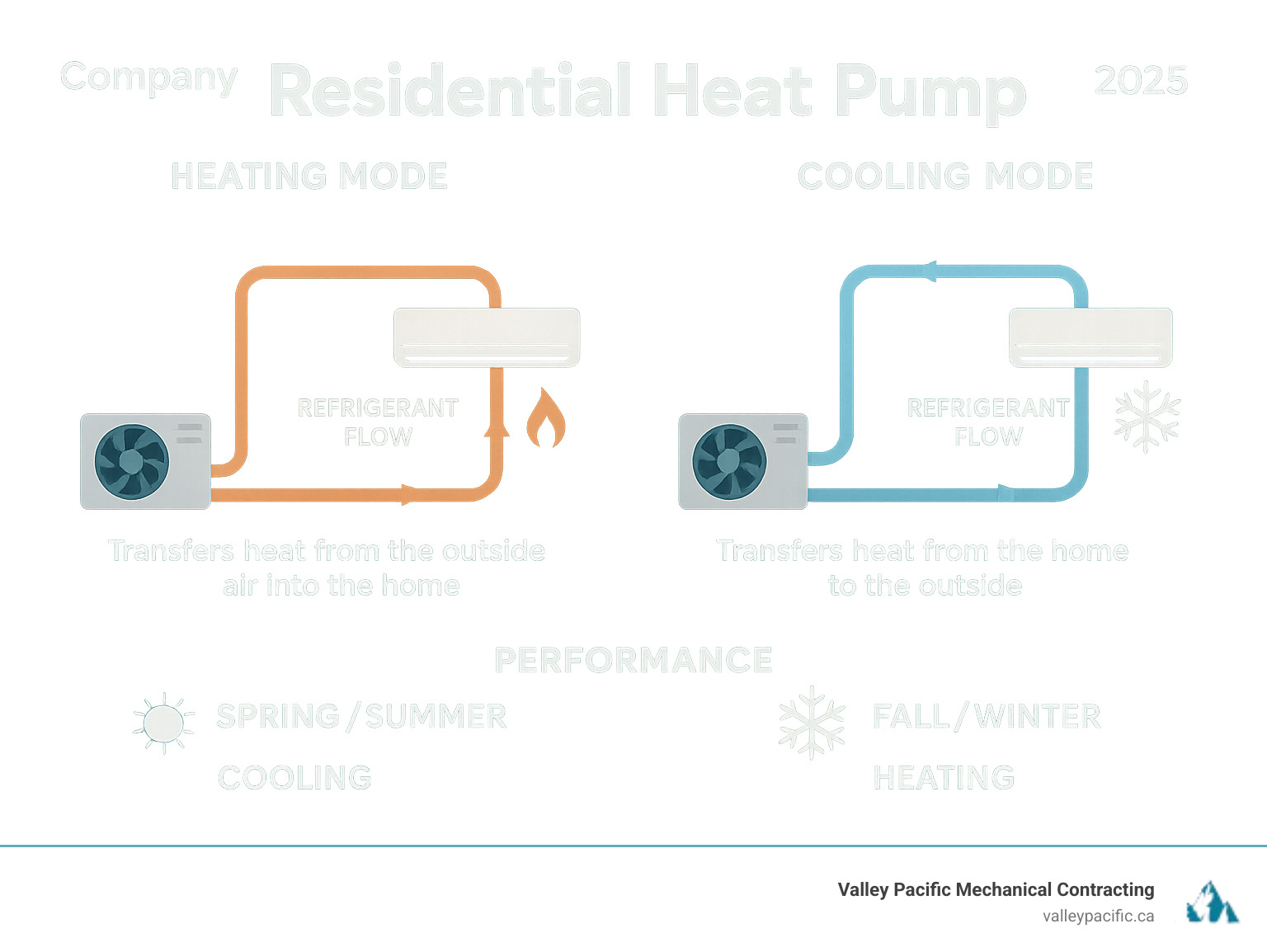
What is a Residential Heat Pump and How Does It Work?
Picture this: you have one system that keeps you cozy in winter and cool in summer, all while using less energy than your old furnace and air conditioner combined. That's the beauty of a residential heat pump – it's like having a temperature wizard that moves heat around instead of creating it from scratch.
The secret behind this magic lies in something called the refrigeration cycle. It's the same principle that keeps your fridge cold, but heat pumps are smart enough to work in reverse. Instead of burning fuel to make heat, they simply transfer heat from one place to another – and they're incredibly good at it.
Here's how the dance works: refrigerant (a special liquid) flows through your system, picking up heat from one location and dropping it off somewhere else. The outdoor unit sits outside your home, while the indoor unit (also called an air handler) lives inside, usually in your basement or utility room.
The real star of the show is the reversing valve – think of it as a traffic director for heat. In heating mode, it tells the system to grab heat from outside air (yes, even when it's freezing!) and bring it indoors. When you switch to cooling mode, it flips the script and moves heat from inside your house to the great outdoors.
What makes this so efficient? Instead of creating heat, your heat pump just moves it around. This clever approach means modern systems can reduce your electricity use for heating by up to 75% compared to electric baseboard heaters. Thanks to advancements in air-source heat pump technology, these systems now work beautifully even in our Lower Mainland winters.
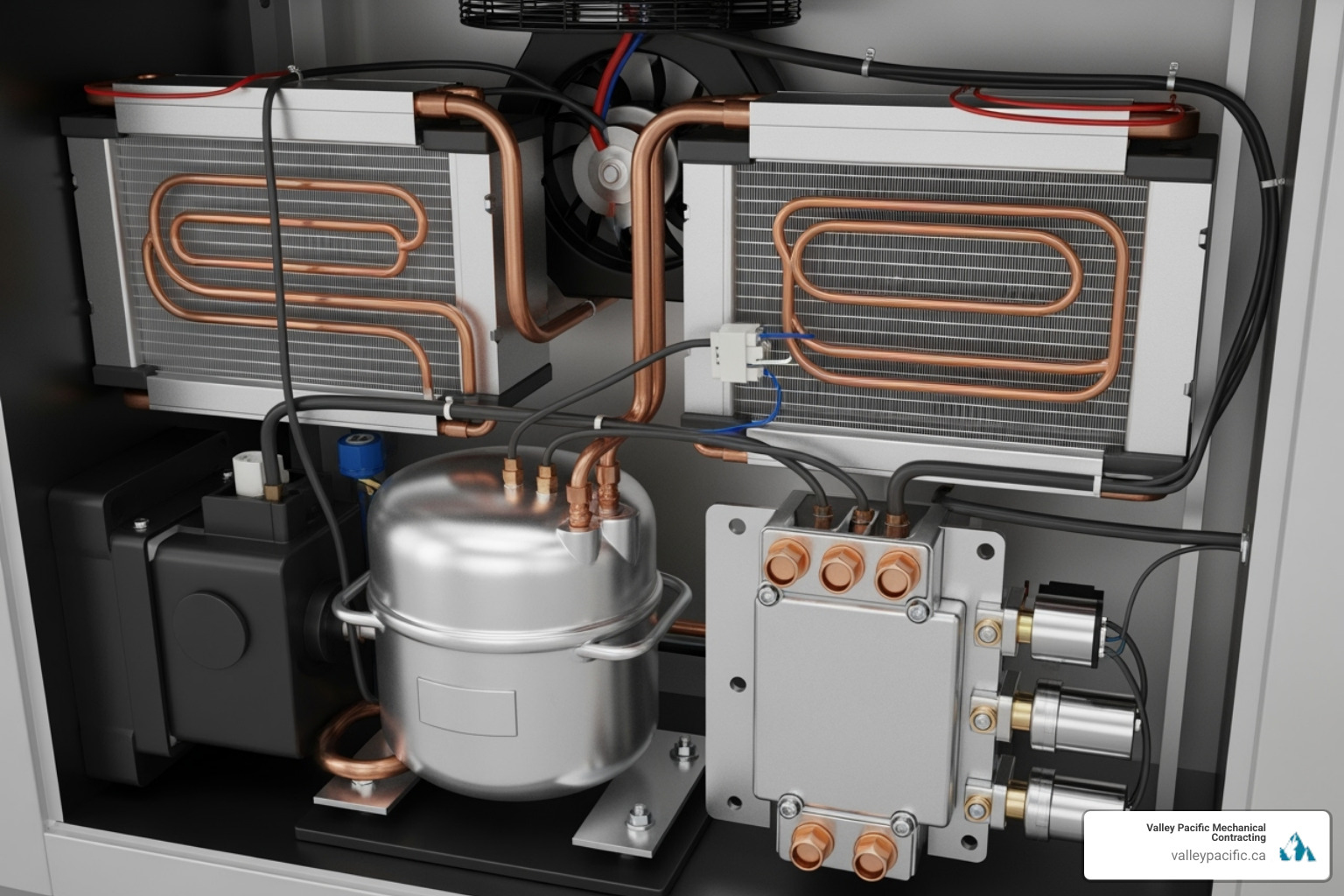
The All-in-One Residential Heat Pump Solution
Remember the days of juggling a furnace and an air conditioner? A residential heat pump puts an end to that complexity by delivering year-round comfort in one neat package. It replaces your furnace in winter and replaces your air conditioner in summer – talk about simplifying your life!
But wait, there's more. Your heat pump also handles dehumidification during those sticky summer months, pulling excess moisture from your air better than traditional AC units. This means you'll feel comfortable at higher temperatures, which translates to lower energy bills.
The best part? You'll enjoy consistent temperature throughout your home. No more hot spots in the living room or chilly corners in the bedroom. Your heat pump works steadily to maintain the perfect climate in every room.
Advanced Heat Pump Technologies
Today's residential heat pumps are light-years ahead of older models, packed with smart features that make them more efficient and comfortable than ever. Variable-speed compressors are game-changers – instead of running at full blast or not at all, they adjust their speed to match exactly what your home needs. Think of it like cruise control for your comfort system.
Inverter technology is the brain behind this smooth operation. An inverter heat pump eliminates the wasteful stop-and-start cycles of older units. Instead, it runs longer at lower speeds, sipping energy while keeping your home perfectly comfortable.
Modern smart thermostats take control to the next level. You can adjust your temperature from anywhere, monitor your energy use, and even get alerts if something needs attention. Many offer two-way communication with your heat pump, optimizing performance automatically. For troubleshooting and advanced features, you can Visit the Support Page of compatible systems.
These technologies work together to create a residential heat pump system that's quieter, more efficient, and smarter than anything available just a few years ago.
Types of Heat Pumps and Their Benefits
When we talk about residential heat pumps, we're actually referring to a family of systems, each designed to leverage different heat sources for optimal performance. The primary types are air-source, ground-source, and dual-fuel (hybrid) systems, each offering unique benefits. However, they all share the overarching advantages of significant energy savings and environmental benefits.
Heat pumps are champions of efficiency because they don't create heat; they move it. This simple principle translates into substantial energy savings. In fact, heat pumps can reduce your electricity use for heating by up to 75% compared to electric resistance heating. Beyond your wallet, this also means a lower carbon footprint for your home, contributing to a healthier planet.
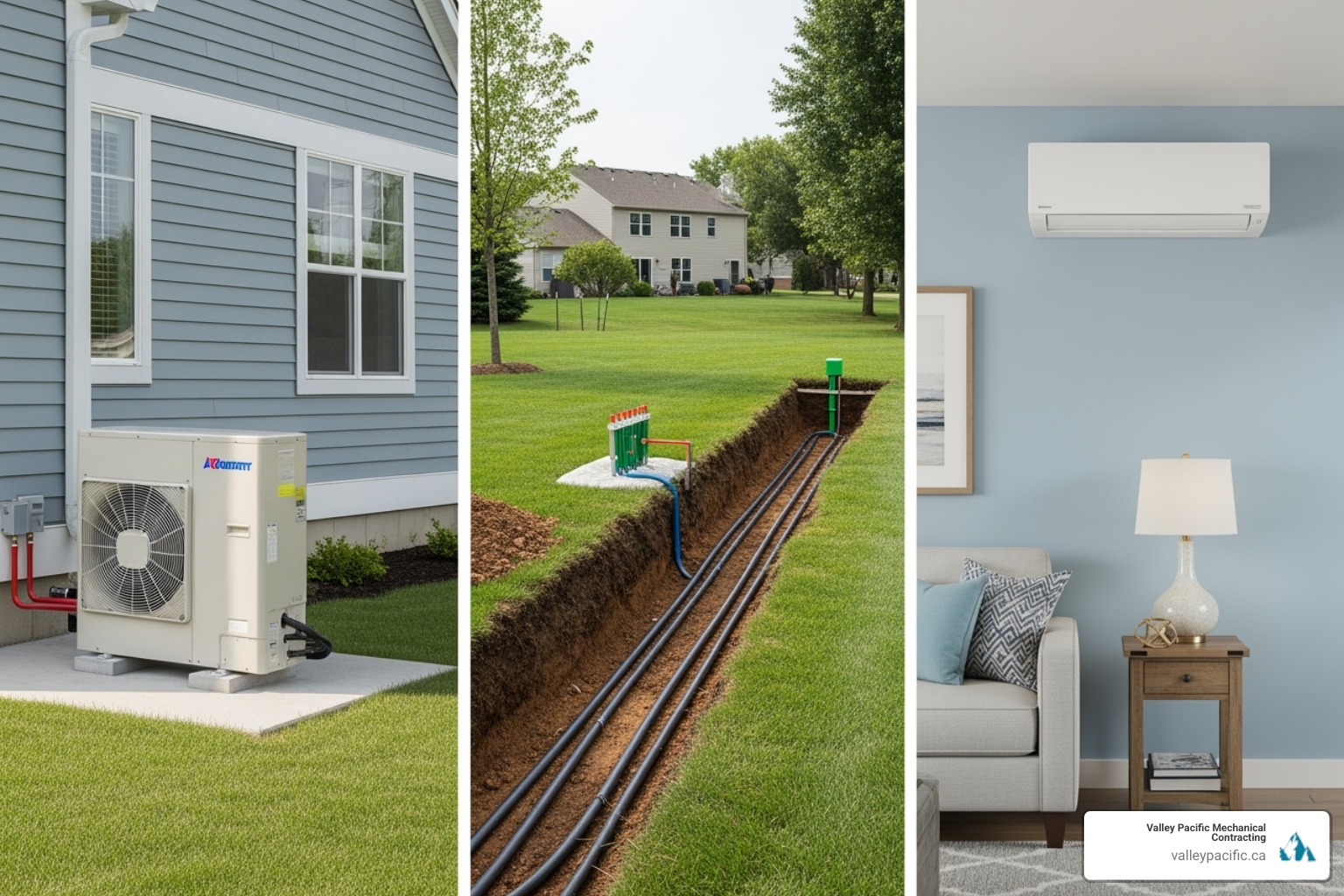
Air-Source Heat Pumps
Air-source heat pumps are the most common type of residential heat pump we encounter, and for good reason. They are versatile, efficient, and typically easier to install than ground-source systems. They work by transferring heat between the air inside your home and the air outside.
Within the air-source category, you'll find:
- Ducted Systems: These are the most direct replacements for traditional central furnaces and air conditioners. They use your home's existing ductwork to distribute heated or cooled air throughout the house. If you're considering a new AC installation, it's worth exploring the benefits of a heat pump AC, as it offers both cooling and heating capabilities. You can learn more about Heat Pump AC options. If you're seeing Signs You Need a New AC Installation, a heat pump could be a superior upgrade.
- Ductless Mini-Splits: These systems are ideal for homes without existing ductwork, additions, or for zoning specific areas. Instead of a central unit, they consist of an outdoor compressor/condenser unit connected to one or more indoor air-handling units via a small conduit. Each indoor unit can control the temperature of a specific room or zone, offering incredible flexibility and energy savings. They differ significantly from central ducted systems by providing highly localized heating and cooling without the need for extensive duct installation.
The key difference between an air-source heat pump and a central air conditioner is the heat pump's ability to reverse its cycle. While a central AC only cools by moving heat out of your home, an air-source heat pump can do that and reverse the process to bring heat into your home during colder months.
Ground-Source (Geothermal) Heat Pumps
Often considered the pinnacle of heat pump technology, ground-source heat pumps, also known as geothermal systems, leverage the stable temperatures found just a few feet below the earth's surface. Unlike air, the ground maintains a relatively constant temperature year-round, making it an incredibly efficient heat source or sink.
- Stable Ground Temperature: Regardless of extreme air temperatures above ground, the earth below remains at a consistent temperature (typically between 7-18°C or 45-65°F). Geothermal heat pumps tap into this stable reservoir, leading to extremely high efficiencies.
- High Efficiency: Because they don't have to contend with wide temperature swings like air-source units, geothermal heat pumps are exceptionally efficient. High-efficiency geothermal heat pumps, like ENERGY STAR-certified heat pumps, use 61% less energy than a standard model.
- Higher Upfront Cost: The main drawback of geothermal systems is their initial installation cost, which can be several times that of an air-source system due to the excavation and installation of underground piping (ground loops).
- Long Lifespan: Despite the higher upfront cost, geothermal systems boast an impressive lifespan. The indoor components can last up to 20-25 years, while the underground ground loops can last 50 years or more, making them a long-term investment in comfort and savings.
Dual-Fuel (Hybrid) Systems
For homeowners in regions with colder winters, where temperatures can occasionally dip below what an air-source heat pump can efficiently handle, a dual-fuel or hybrid heat pump system offers the best of both worlds.
- Heat Pump with Furnace: This system combines a high-efficiency electric heat pump with a traditional fossil-fuel furnace (usually natural gas or propane).
- Automatic Switching: The system is intelligently designed to automatically switch between the heat pump and the furnace based on outdoor temperatures. The heat pump handles most of the heating in milder weather, leveraging its superior efficiency. When temperatures drop below a certain point (the "balance point"), the system automatically switches to the furnace, which can provide more intense heat more economically in extreme cold.
- Cold Climate Solution: This setup is an excellent cold climate solution, ensuring consistent comfort even on the coldest days while maximizing efficiency throughout the rest of the year. It allows homeowners to enjoy the benefits of a heat pump's energy efficiency for the majority of the heating season, with the reliability of a furnace as a backup. If you're weighing your heating options, these systems give you solid Consider Heat Pump Installation Reasons.
How to Choose the Right Heat Pump for Your Home
Choosing the perfect residential heat pump for your home might feel overwhelming at first, but it doesn't have to be. Think of it like finding the right pair of shoes – you need something that fits your space, suits your lifestyle, and works within your budget. The good news is that we're here to guide you through every step of the process.
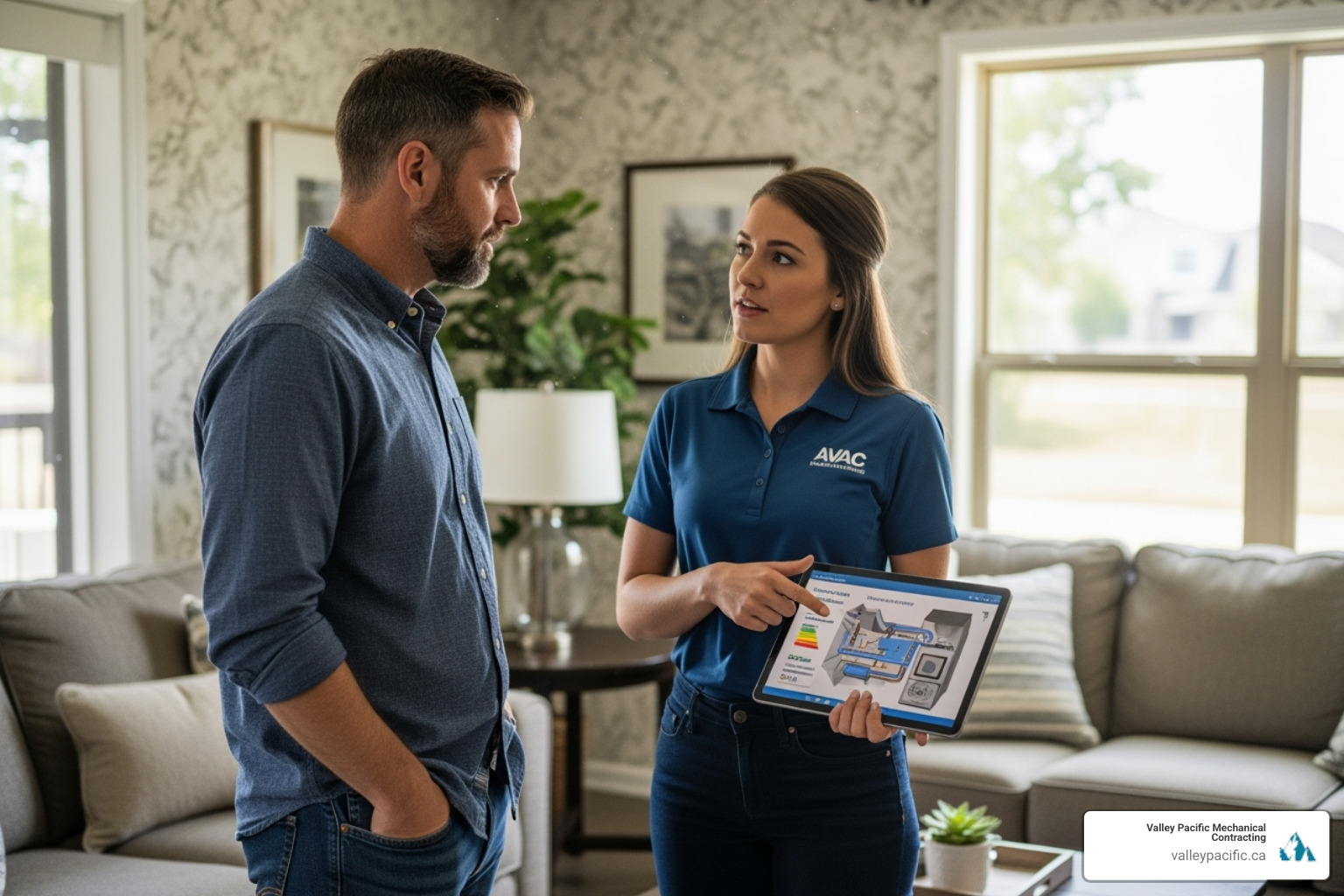
When we visit your home for a consultation, we look at several key factors to ensure you get the right system. Home size and layout are crucial – a larger home needs more heating and cooling capacity, while an open-concept layout distributes air differently than a home with many separate rooms.
Your home's insulation and air sealing quality makes a huge difference too. A well-insulated home stays comfortable with a smaller, more efficient heat pump, which means lower operating costs for you. We often find that homes with poor insulation benefit from upgrades before installing a new system.
Local climate is another important consideration. While BC's Lower Mainland has a moderate climate that's perfect for heat pumps, we still need to account for those occasional cold snaps. Understanding your area's temperature patterns helps us recommend whether a standard air-source unit will do the job or if a dual-fuel system makes more sense.
Budget considerations go beyond just the initial purchase price. We help you understand the complete picture – installation costs, long-term operating savings, and available rebates. Sometimes spending a bit more upfront on a high-efficiency model pays for itself through energy savings.
The condition of your existing ductwork also plays a role. If your ducts are in good shape, a ducted system might be the most cost-effective option. If not, ductless mini-splits could actually save you money while providing better comfort control.
Finally, we discuss your desired features. Do you want smart thermostat integration for remote control? Is quiet operation important because your bedroom is near the outdoor unit? These preferences help us narrow down the perfect match.
Understanding Efficiency: SEER2 and HSPF2 Ratings
Here's where things get a bit technical, but don't worry – we'll break it down in simple terms. When you're shopping for a residential heat pump, you'll see ratings called SEER2 and HSPF2. These numbers are like fuel economy ratings for cars – they tell you how efficiently your heat pump will operate.
SEER2 (Seasonal Energy Efficiency Ratio 2) measures how efficiently your heat pump cools your home during summer. Think of it as miles per gallon, but for cooling. The higher the SEER2 number, the less electricity your system uses to keep you comfortable on hot days.
HSPF2 (Heating Seasonal Performance Factor 2) does the same thing for heating performance during winter months. Again, higher numbers mean better efficiency and lower energy bills.
These updated ratings became the standard in January 2023, and they're more accurate than the old ratings because they reflect real-world conditions better. The Department of Energy now requires split system heat pumps to have a SEER2 of at least 14.3, and heating efficiency must meet an HSPF2 of 7.5 or higher.
When we recommend high-efficiency heat pumps, we're looking for units that exceed these minimum standards. Yes, they cost a bit more upfront, but the energy savings add up quickly. It's like choosing an efficient car – you spend less on fuel every month.
Choosing a Residential Heat Pump for Your Climate
Living in BC's Lower Mainland gives you a real advantage when it comes to heat pump performance. Our moderate climate is honestly ideal for this technology. Most of the year, temperatures stay within the sweet spot where heat pumps operate at peak efficiency.
The beauty of our climate is that an air-source residential heat pump can handle the vast majority of your heating needs beautifully. Even when it's chilly outside, there's still plenty of heat in the air for a modern heat pump to extract and bring into your home.
For those occasional cold snaps we get in the Lower Mainland, today's heat pumps are far more capable than older models. Modern cold climate heat pumps can work efficiently even when temperatures drop well below freezing. However, if you live in an area that experiences extended periods of very cold weather, we might recommend a dual-fuel system that pairs your heat pump with a backup heating source.
The ENERGY STAR Cold Climate label identifies heat pumps specifically designed for colder regions. These units maintain their efficiency down to -22°F (-30°C), which is far colder than we typically see in our area.
What makes BC particularly great for heat pumps is that you get advantages in cold weather without dealing with disadvantages in extreme cold. You'll enjoy efficient, comfortable heating throughout our mild winters, with reliable performance even on our coldest days.
Cost and Available Incentives
Let's talk about the financial side of things – because we know that's a big part of your decision. The cost of a residential heat pump involves three main components: what you pay upfront, installation costs, and what you'll spend on energy over the years.
While the initial investment might be higher than a basic furnace, heat pumps typically cost less to operate thanks to their incredible efficiency. Think of it like buying a hybrid car – you might pay more initially, but you save money every month on fuel.
Here's how heat pumps generally compare to traditional heating and cooling systems:
| Cost Factor | Heat Pump | Traditional Furnace + AC System |
|---|---|---|
| Upfront Cost | Moderate to Higher | Moderate |
| Operating Cost | Lower (due to high efficiency) | Higher |
| Lifespan | Average (15 years, with proper maintenance) | Average (15-20 years for furnace, 10-15 for AC) |
| Environmental Impact | Very Low (no fossil fuel combustion) | Higher (combusts fossil fuels) |
The really exciting news is the rebates available right now. BC Hydro offers rebates of up to $2,500 when you replace electric heating with a qualifying heat pump. For some whole-home systems and income-qualified households, rebates can be even higher.
FortisBC also provides substantial rebates for homes currently heated with electricity, often worth thousands of dollars depending on your system size and coverage. The CleanBC programs add another layer of support through the Better Homes and Home Renovation Rebate Program.
These incentive programs change regularly, and new ones pop up throughout the year. That's why we always check for the latest rebates when we provide your quote – we want to make sure you get every dollar of savings available to you.
Installation, Maintenance, and Lifespan
Getting your residential heat pump installed and keeping it running smoothly isn't rocket science, but it does require the right expertise and consistent care. Think of it like getting a new car – you want a skilled mechanic to set everything up properly, and then you need to keep up with regular maintenance to ensure it serves you well for years to come.
Professional installation is absolutely critical for your heat pump's success. We've seen too many homeowners struggle with systems that were poorly sized or incorrectly installed by inexperienced technicians. An undersized unit will work overtime trying to keep up with your home's needs, while an oversized system will constantly cycle on and off, wasting energy and creating uncomfortable temperature swings.
Our experienced team takes the guesswork out of installation by carefully analyzing your home's unique characteristics – square footage, insulation quality, window placement, and even how your family uses different spaces. We also consider the Best Locations for Heat Pump Placement to ensure optimal performance while keeping your outdoor unit positioned for both efficiency and curb appeal.
Regular maintenance is where many homeowners either excel or fall short, and it makes all the difference in your system's performance and longevity. Your heat pump works hard year-round, so it deserves some attention to keep running at its best.
Filter changes are the simplest yet most important task you can handle yourself. Clean filters mean better airflow, improved indoor air quality, and lower energy bills. We recommend checking your filters monthly – if they look dirty or clogged, it's time for a change. Depending on your household (pets, allergies, dust levels), you might need to replace them every 1-3 months.
Annual service is where our professional maintenance really shines. During these comprehensive check-ups, we inspect your system from top to bottom – cleaning coils, checking refrigerant levels, testing electrical connections, and catching potential problems before they turn into expensive repairs. Our Seasonal Heat Pump Maintenance Tips can help you stay on top of basic care between our visits.
Expected Lifespan and Common Repairs
A well-cared-for residential heat pump should provide reliable comfort for an average of 15 years, though many of our customers enjoy even longer service lives with proper maintenance. The key factors that influence how long your system lasts include the quality of installation, consistent maintenance, your local operating conditions, and the overall unit quality.
Regular maintenance has the biggest impact on longevity. Systems that receive annual professional service and regular filter changes consistently outlast those that are neglected. It's really that simple – a little care goes a long way.
Even the most reliable heat pumps can experience occasional issues, and we're here to help when they do. Refrigerant leaks are among the most common problems we encounter. If your system isn't heating or cooling as effectively as it used to, low refrigerant might be the culprit.
Defrosting problems can occur during colder weather when ice builds up on the outdoor coil. Your heat pump has a built-in defrost cycle to handle this naturally, but sometimes this system needs attention. Other common issues include general wear and tear on components like capacitors, fan motors, or compressors – all normal parts of a system's aging process.
If you notice unusual noises, reduced performance, or higher energy bills, these could be Signs Your Heat Pump Needs Repair. Don't wait until a small problem becomes a big headache – we provide prompt, professional Heat Pump Repair Mission BC and throughout the Lower Mainland.
The bottom line? With proper installation and regular care, your residential heat pump will provide years of efficient, reliable comfort while keeping your energy bills in check.
Conclusion
As we wrap up our journey through residential heat pumps, it's clear these remarkable systems are more than just another heating and cooling option – they're a game-changer for modern home comfort. We've finded how these clever devices work by transferring heat rather than creating it, making them incredibly energy efficient while delivering year-round comfort that keeps your home perfectly cozy in winter and refreshingly cool in summer.
The numbers speak for themselves. With the ability to reduce your heating electricity use by up to 75% compared to traditional electric systems, heat pumps offer substantial long-term savings that add up month after month, year after year. But it's not just about your wallet – it's about making a positive impact on our environment too. By choosing a heat pump, you're reducing your carbon footprint and contributing to a cleaner, greener future for British Columbia.
Whether you're drawn to the versatility of air-source systems, the incredible efficiency of geothermal units, or the reliability of dual-fuel setups, there's a heat pump solution that's perfect for your home and budget. The advanced technologies we've explored – from variable-speed compressors to smart thermostats – ensure you'll enjoy precise temperature control, whisper-quiet operation, and maximum efficiency.
For a headache-free experience from consultation to installation in the Lower Mainland, trust the experts at Valley Pacific Mechanical Contracting. With over 30 years of expertise and a commitment to the Daikin Comfort Promise, we provide comprehensive HVAC services, including professional heat pump installation, maintenance, and repair. Whether you're in Langley, Pitt Meadows, Maple Ridge, Mission, or Coquitlam, we're here to ensure your home stays perfectly comfortable, year-round.
The transition to efficient, smart home comfort has never been easier. Ready to experience the benefits of a residential heat pump for yourself? Get a professional heat pump installation in Maple Ridge or contact us today to learn more about our services in your area!




